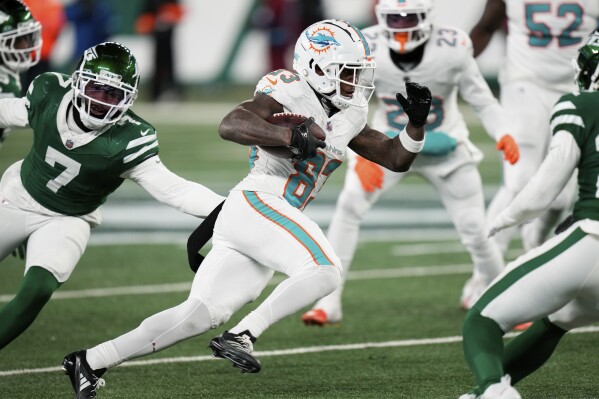Real Madrid’s stadium will host the Miami Dolphins’ first NFL game in Spain.
The National Football League (NFL) has taken another major step in its international expansion by announcing that the Miami Dolphins will play a historic regular-season game at Real Madrid’s Santiago Bernabéu Stadium in 2025. This will mark the first time an NFL game is played in Spain, signaling a significant move for both the league and the country. The event is expected to attract thousands of fans from across Europe and beyond, further solidifying the NFL’s global reach.
Significance of the Event
The upcoming game represents a pivotal moment in the NFL’s international strategy. The league has been actively working to expand its presence outside North America, and the selection of Madrid as a host city is a testament to Spain’s growing interest in American football. The league’s Head of Europe and APAC, Brett Gosper, emphasized the importance of this expansion, stating, “The exciting first-ever game in Spain underlines the NFL’s continued commitment to expanding its global footprint and reaching new audiences across the world.”
The game will serve as an opportunity for Spanish fans to experience live NFL action firsthand, fostering greater enthusiasm for the sport and potentially inspiring local talent to pursue careers in American football. Spain has seen a rise in interest in the sport, with an increasing number of amateur teams and youth programs emerging in recent years.
Miami Dolphins’ Role in the Global Expansion
The Miami Dolphins have been one of the most internationally active teams in the NFL. Their participation in this historic game aligns with the NFL’s Global Markets Program (GMP), which grants teams international marketing rights to build brand awareness and connect with fans beyond the United States.
The 2025 game in Madrid will be the Dolphins’ eighth regular-season game played outside the U.S. and their fourth in a new country, following previous games in Germany (2023), the United Kingdom (multiple years), and Canada (2008). Tom Garfinkel, the Dolphins’ Vice Chairman, President, and CEO, expressed excitement about the game in Madrid, highlighting Spain’s “rich history, tradition, and passion,” and noting that it is “home to a vibrant Dolphins fanbase.”
As part of their international outreach, the Dolphins have actively engaged with Spanish fans through watch parties, alumni appearances, and Spanish-language content. In 2024, the team expanded its GMP reach to Argentina, Colombia, and Mexico, making them the NFL franchise with the most Spanish-speaking countries under their marketing umbrella.
The Santiago Bernabéu Stadium: A World-Class Venue
The decision to host the game at Santiago Bernabéu Stadium is a strategic one. Home to Real Madrid C.F., one of the most successful soccer clubs in history, the stadium has recently undergone extensive renovations, making it a state-of-the-art facility suitable for various events beyond soccer.
With a seating capacity exceeding 78,000, the stadium provides an ideal setting for a high-profile NFL game. Its modernized infrastructure includes a retractable roof and a cutting-edge playing surface that can accommodate different sports, including American football. Emilio Butragueño, Real Madrid’s Director of Institutional Relations, remarked, “This partnership with the NFL will bring one of the world’s most prestigious sporting competitions to the Santiago Bernabéu, a stadium which has welcomed millions of passionate fans from around the globe to enjoy incredible sporting experiences.”
Hosting an NFL game in such an iconic venue is expected to elevate the event’s prestige and attract fans from across Europe. The Santiago Bernabéu has already proven its ability to host major events beyond soccer, and this game will further demonstrate its versatility on the global stage.
Economic and Cultural Impact on Madrid
Beyond the game itself, hosting an NFL regular-season matchup is expected to have significant economic and cultural benefits for Madrid. The Community of Madrid has approved an investment of €1.5 million to sponsor the event, aiming to solidify the city’s position as a hub for major sporting events and to promote the region as a tourist destination.
The influx of tourists, including NFL fans from across Europe and the United States, is expected to provide a substantial boost to the local economy. Hotels, restaurants, and businesses near the stadium stand to benefit from the increased foot traffic. Additionally, the event will put Madrid on the map as a city capable of hosting large-scale international sporting events beyond traditional soccer tournaments.
Culturally, the event provides an opportunity for Spanish fans to immerse themselves in the unique experience of an NFL game. From tailgating traditions to the spectacle of halftime entertainment, the game will introduce many locals to the full breadth of American football culture.
NFL’s Broader International Initiatives
The Madrid game is part of the NFL’s broader strategy to globalize the sport. In addition to Spain, the league has hosted regular-season games in the United Kingdom, Germany, and Mexico. The NFL’s commitment to international expansion is evident in its multi-year agreements to continue playing games in London and Germany, as well as ongoing discussions to bring games to other countries.
For the 2025 season, the NFL has announced additional international games, including matchups in London and Berlin. Teams such as the New York Jets, Cleveland Browns, Jacksonville Jaguars, and Indianapolis Colts are expected to participate in these overseas contests, further demonstrating the league’s commitment to reaching diverse international markets.
The NFL’s international push is not limited to live games; the league has also invested in digital content, grassroots programs, and partnerships with local sports organizations to grow the game globally. The ultimate goal is to create a sustainable fanbase in new markets, with the long-term potential of developing homegrown talent who could eventually play in the NFL.
Challenges and Considerations
While the NFL’s international expansion has been largely successful, there are challenges associated with hosting games in new markets. One of the primary concerns is ensuring that the playing surface at Santiago Bernabéu meets NFL standards. Unlike natural grass fields commonly found in U.S. stadiums, the hybrid playing surface at the Bernabéu will need to be adapted to support the physical demands of American football.
Additionally, logistics such as team travel, fan accommodations, and broadcasting schedules will require careful coordination. The time difference between Spain and the U.S. may impact viewership, particularly for fans in the United States who are accustomed to traditional Sunday game times.
Despite these challenges, the potential rewards of expanding into Spain outweigh the risks. The NFL has successfully navigated similar challenges in London and Germany, demonstrating its ability to adapt and thrive in international markets.
What This Means for the Future of the NFL in Spain
The Miami Dolphins’ game at Santiago Bernabéu could be the beginning of a long-term relationship between the NFL and Spain. If the event proves successful, it may open the door for additional games in future seasons and possibly lead to the establishment of an annual NFL presence in the country.
Spain has a growing community of American football enthusiasts, with teams competing in the Liga Nacional de Fútbol Americano (LNFA), the country’s premier American football league. Increased exposure to the NFL could further fuel the sport’s popularity and lead to greater investment in local leagues and development programs.
From a broader perspective, the success of the Madrid game could influence the NFL’s decisions on future international markets. Countries such as Brazil, China, and South Korea have been mentioned as potential hosts for future games, reflecting the league’s ambitious global vision.
The upcoming NFL game at Santiago Bernabéu Stadium marks a significant milestone in the globalization of American football. For the Miami Dolphins, it represents an opportunity to connect with a broader fanbase and to showcase the sport’s excitement on an international stage. For Madrid and Spain, it offers economic benefits and the chance to host a world-class sporting event.
As the NFL continues to expand its international presence, events like this underscore the universal appeal of the game and its capacity to unite fans across cultures. With the right strategies in place, the Madrid game could be the catalyst for further NFL growth in Spain and beyond, bringing American football to new audiences and strengthening its global standing.



